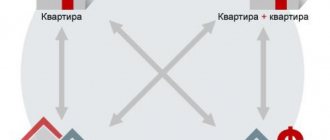After the collapse of the USSR, an active process of privatization of public housing began. The essence of this procedure is that ownership of the property is transferred from the municipal body to a person who has permanent registration on the territory of the housing. The legislation of the Russian Federation provides for the opportunity for each citizen to privatize living space free of charge once. This process has been going on for more than 20 years. The government has repeatedly moved the deadline for the end of the free privatization program and, from the beginning of 2021, made it indefinite.
Despite this, many citizens prefer to live in housing provided by the state and are in no hurry to register it as private property. But often life circumstances force members of the same family to move away. As a rule, an exchange of living space is required when spouses divorce. Whatever the situation, the procedure will have to be carried out in accordance with legal requirements.
Is it possible to exchange?
You got on the waiting list for social (municipal) housing, collected all the necessary certificates, waited the required amount of time and finally received the coveted apartment. What to do if the place of residence provided does not live up to expectations?
The legislation of the Russian Federation does not prohibit the exchange of non-privatized municipal housing (Article 72 of the Housing Code of the Russian Federation), but registration will require a lot of effort and time.
Important! If the apartment belongs to the flexible fund, is official or specialized, its exchange is impossible before privatization.
The exchange procedure has many pitfalls - they begin with the search for a suitable option for exchange, which is also municipal housing and assumes a similar area. Obtaining the consent of all persons who live in the apartment and the landlord is also not always easy - if one of the family members refuses, you will have to go to court for a forced exchange procedure.
There are also nuances regarding counter real estate:
- The exchange of non-privatized municipal housing for non-privatized housing is available to everyone . To do this, it is necessary to select an alternative that is suitable in all respects and obtain the written consent of the landlord and all family members living on the premises.
- It is impossible to exchange non-privatized housing for privatized housing . Article 72 of the Housing Code of the Russian Federation establishes that exchange between apartments can only occur in the case of the same form of ownership.
Who can I exchange housing with?
Options for exchanging non-privatized housing:
- Between relatives. Popularly, this procedure is called “kinship exchange.” The transaction is made between relatives, on trust. In this case, non-privatized housing can be exchanged for both non-privatized and privatized housing. For example, a grandmother moves from her apartment to a municipal one, and her grandson and his family move to a privatized one.
- Between tenants of municipal housing. The transaction is possible only if all residents on both sides agree to it, and the consent of the owner is obtained.
- Between the employer and the state. Returning the apartment back to the state in exchange for housing of a smaller area. Such cases are extremely rare, but still occur. For example, when employers have a difficult financial situation and want to reduce rent costs.
All these types of transactions have one thing in common - the idea of exchange came to the minds of the employers. But there are cases when the state confronts residents of municipal apartments with a fait accompli. For example, the house is in disrepair and will soon be moved to new comfortable housing.
What is the procedure for a social tenancy agreement?
If there is a need to exchange residential premises provided under a social tenancy agreement, you must prepare for a lengthy process.
Where to start?
The beginning of the exchange of municipal housing is obtaining the consent of the owner and searching for a suitable object. There are several mandatory conditions for choosing housing for exchange:
- Housing must be non-privatized.
- Living conditions should not get worse.
- The area of a suitable room is calculated based on the fact that at least 12 meters must be allocated for each resident.
Where to contact?
Searching for housing exchanges on special websites is quite difficult - there are rarely offers for municipal apartments there. To select options, you can contact the city administration, if it provides such services.
Important! If minors, incapacitated or partially capable citizens - members of the tenant's family - live in residential premises, it is required to contact the guardianship and trusteeship authorities and obtain their consent.
We will allow the exchange of social residential premises located both in the same and in different settlements on the territory of the Russian Federation.
Full list of documents
Required to submit:
- Application signed by the employer and all members of his family.
- Social tenancy agreement.
- Certificate of absence of debts to pay for accommodation.
- A certificate indicating everything registered in the apartment.
- If there are minors in the family, you will need a certificate of consent to change housing from the guardianship and trusteeship authorities.
- Applicant's passport.
Where to submit documents?
All collected consents and documents are submitted to the governing body of the municipality to which this living space belongs. There is an agreement drawn up between the tenant and the landlord independently or with the help of a lawyer. Since such an agreement is written in free form, it does not need to be certified by a notary.
Attention! A similar package of documents must be collected by the second party - those with whom the housing will be exchanged.
Cost and processing time
It is impossible to clearly indicate the period during which the transaction will take place. If all participants in the process sign an agreement to exchange, this will significantly reduce the processing time. If a trial is necessary, the process can be very lengthy. In any case, all operations will take several months.
All stages of registration are free . A fee can only be charged when the tenant contacts a lawyer, in the event of a court case in case of a forced exchange, or turns to specialists to find suitable housing.
Conclusion of an agreement
Main points in the contract:
- Date and place of document preparation.
- Document's name.
- Passports of all participants in the transaction, place of residence and registration, contact information.
- Name of the living space and data on it (cadastral number, cost, size, number of rooms, etc.).
- Name of the authorized body for the disposal of such property.
- Technical information (from BTI).
- Information about the absence of obstacles in the transaction.
- A record of acceptance of the premises in a certain condition, as well as the keys to it.
- Additional items as agreed by the parties.
- Number of copies.
- Information about the parties’ awareness of the meaning and consequences of signing the document.
- Details of the parties.
- Signatures.
Reference! An exchange agreement is taken as a sample for drawing up a contract.
We do not recommend completing the documents yourself. Save time - contact our lawyers by phone:
8 (800) 302-76-94
Registration of a transaction
After completing the exchange agreement, it is necessary to re-conclude a social tenancy agreement with the municipality and register with it. This service is free.
Reasons and grounds for refusal
There are situations when a tenant may be denied registration for a housing exchange:
- Lack of consent to the transaction by one of the family members. If the refusal is unlawful, then the issue is resolved through the court.
- Objects of exchange vary greatly in condition or area, which will lead to a deterioration in living conditions.
- Infringement of the rights of a minor.
- Exchange for privatized housing.
- Termination of a social tenancy agreement with one of the parties.
- Utility debts.
Alternative types of transactions
The contract can specify exactly the same cost for each of the objects. And the additional payment will be made later, after the agreement is concluded. This option will be optimal for many. It will not only reduce time costs, but also create favorable conditions for conducting so-called multi-stage transactions.
But in this case, there is a danger that the registration authority will still see the difference between the objects of exchange. On the basis of which the transaction is declared void.
In the exchange, the main thing is that the tenant’s living conditions do not worsen after the procedure. Otherwise, difficulties arise later if you need to get in line to improve them. Government authorities will decide that the conditions were spoiled intentionally. And they will refuse to consider the application.
What is a compulsory procedure?
Forced exchange of residential premises is the exchange of living space by court order between persons living in the same territory. The transaction is regulated by Art. 72 Housing Code of the Russian Federation.
Causes
The reason for the exchange and filing an application with the court may be:
- disagreement of residents or the municipality with the transaction;
- divorce;
- requirements of adults for separate living space.
The main reason for going to court is the inability to live together due to poor family relationships.
Which municipal housing can be forcibly exchanged and which cannot?
Only municipal non-privatized housing can be forcibly exchanged . In some cases, it is impossible to make a forced exchange (Article 73 of the RF Housing Code). This is due to the characteristics of the room itself:
- The apartment or house in which it is located is subject to major repairs or redevelopment in the near future.
- The housing is considered unsafe and the house is subject to demolition.
In addition to the housing assessment, the reason for refusing an exchange through the court may be the termination of a social tenancy agreement. If the municipality is going to terminate the contract soon, there can be no talk of any exchange.
Important! An exchange is impossible if as a result of it a citizen suffering from a severe chronic disease from the List moves into the residential premises.
What can you do?
A municipal apartment can only be exchanged for such types of housing that comply with:
- Standards for living space sizes.
- Sanitary standards for residential premises.
- Interests of minor children.
- Interests of citizens with disabilities and serious illnesses.
When selecting options for exchange, the main factor becomes the preservation of normal living conditions for all members of the transaction.
Trial
After filing a claim for the exchange of social housing, a lengthy legal process will begin with the participation of all parties. For each claim, its own place of consideration and trial is established. In the case of a forced exchange of municipal housing, you should apply to the court of general jurisdiction for the territorial location of the property.
To file a claim, the tenant of a social apartment will need:
- Statement of claim.
- Social tenancy agreement.
- Residents' consent to resettlement (if received).
- Consent of the municipality (if received).
- Certificate of all persons registered in the apartment.
- Certificates of absence of debts for utility services.
- Floor plans.
- Divorce certificate or other materials that explain the reason for the exchange request.
Depending on each specific case, the package of documents may be changed.
The statement of claim states:
- Name of the judicial authority.
- The title should be “Statement of Claim for the forced exchange of a non-privatized apartment.”
- Full name, address and passport details of the plaintiff.
- A short summary of the requirements with links to articles of the RF Housing Code.
- Information about other residents.
- List of attached documents.
- Date and signature.
We do not recommend completing the documents yourself. Save time - contact our lawyers by phone:
8 (800) 302-76-94
The state fee when going to court is 300 rubles . After submitting the application and all necessary documents to the court, a decision will be made within 30 days.
Refusal to exchange
When exchanging non-privatized housing, you should act exclusively within the framework of existing legislation. If the procedure is violated, the transaction will be denied to you.
You definitely won’t be able to exchange your home if:
- it will be proven that the transaction is fictitious;
- housing is located in a closed military camp;
- the living conditions of one of the parties will deteriorate significantly after the move.
Refusal to exchange municipal housing is made by the local administration in writing. In addition to the decision itself, the document must contain its detailed justification. If tenants do not agree with the owner’s verdict, they have the right to seek judicial protection of their violated rights.
If the tenants do not agree on the size
Important! You can exchange a non-privatized apartment even if the other residents do not agree. But this will require going to court.
Resolving exchange disputes can take several years. If there are no reasons that prevent the exchange of an apartment, you can go to court and file a lawsuit to resolve this issue. In this case, an important role can be played by the fact that it is impossible to live together with an individual tenant, which means there is an urgent need to leave. Proof of this fact can be certificates from the police about the tenant’s indecent behavior, or a certificate from a narcologist confirming his alcoholism. Testimonies given by neighbors can also be a plus.
If evidence of the impossibility of cohabitation is not provided, the court may refuse the requirements of the statement of claim (
Ways to find an apartment
As a rule, there are two ways to find an apartment for exchange: on your own or with the help of a real estate specialist. The option with a realtor is less problematic: a specialist will quickly help you find the apartment you need, explain what documents are needed for this transaction, and assist in the correct paperwork. However, the services of a person in this profession are paid, so it is worth considering this option again.
If you are looking for housing on your own, you will have to work hard: find out possible options from your friends, submit advertisements in newspapers, search on the Internet. In any case, each person must decide which option suits him best.
Barter agreement
The mandatory procedure for registering a contract requires the following documents:
- Identity cards;
- Documents on the ownership of real estate;
- Certificate of absence of arrests and encumbrances;
- Consent of the guardianship authorities (if one of the owners of the property is a minor).
After all the documents have been collected and the agreement has been registered, you can draw up a social rent agreement and complete the exchange of the non-privatized apartment.









